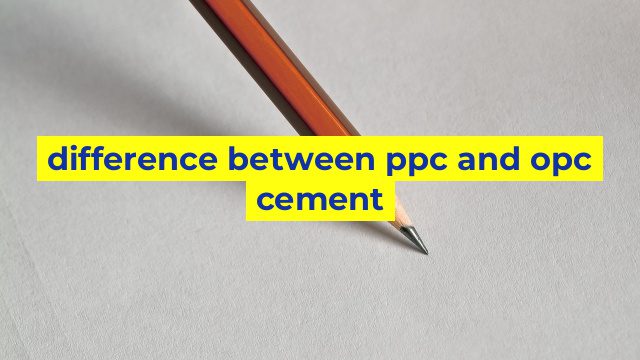Difference Between PPC and OPC Cement
In the world of construction and engineering, cement plays a vital role. It is the binding agent that holds concrete, mortar, and other materials together. When we talk about cement, two popular types come to mind: PPC and OPC. While they may seem similar, there are significant differences between these two types of cement. In this article, we’ll take a closer look at the differences between PPC and OPC cement.
What is PPC Cement?
PPC or Portland Pozzolana Cement is made by mixing ordinary portland cement (OPC) clinker and pozzolanic material such as fly ash, volcanic rock, or slag. The addition of pozzolanic materials makes PPC cement more durable and resistant to chemical attacks. PPC cement is also known for its low heat of hydration, which makes it ideal for mass construction projects. It is often used in the construction of dams, bridges, and high-rise buildings.
What is OPC Cement?
OPC or Ordinary Portland Cement is a popular type of cement that is commonly used in construction projects. It is made by grinding clinker with gypsum and a small amount of other materials. OPC cement is known for its strength and durability, making it ideal for projects that require high compressive strength. It is commonly used in the construction of buildings, bridges, and roads.
What is the Difference Between PPC and OPC Cement?
The main difference between PPC and OPC cement lies in their composition. PPC cement contains pozzolanic materials, which makes it more durable and resistant to chemical attacks. On the other hand, OPC cement has a higher compressive strength, making it ideal for projects that require high strength and durability.
PPC cement is more eco-friendly as it uses waste materials like fly ash, volcanic rock or slag as a replacement for cement. OPC cement is produced in a more energy-intensive manner than PPC cement which contributes more to carbon emissions.
Another difference between PPC and OPC cement is their setting time. PPC cement has a slower setting time than OPC cement because of its low heat of hydration. This slower setting time makes PPC cement ideal for mass construction projects since it gives workers more time to work with the cement.
Which Cement is Better for Construction ?
The choice between PPC and OPC cement depends on specific construction requirements. If the project demands high compressive strength, then OPC cement should be used. For projects that require resistance to chemical attacks and durability, PPC cement is the better choice. Additionally, if the environmental factor is a consideration, then PPC cement should be used as it is more eco-friendly.
In conclusion, both PPC and OPC cement have their unique advantages and disadvantages. It is essential to know the specific requirements of the construction project before deciding which cement to use. By understanding the differences between PPC and OPC cement, you can make an informed decision and ensure the success of your construction project.
Table difference between ppc and opc cement
| Criteria | PPC Cement | OPC Cement |
|---|---|---|
| Type of Cement | Portland Pozzolana Cement | Ordinary Portland Cement |
| Composition | Contains fly ash or other pozzolanic materials | Only contains clinker, gypsum, and other additives |
| Strength | Lower initial strength but gains strength over time | Higher initial strength but slower strength gain over time |
| Uses | More suitable for large constructions, in bridges, dams and large buildings | Used for general construction when high early strength is not necessary. |
| Cost | Generally less expensive than OPC | More expensive than PPC |
